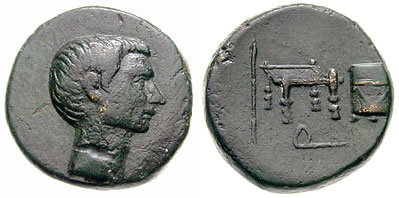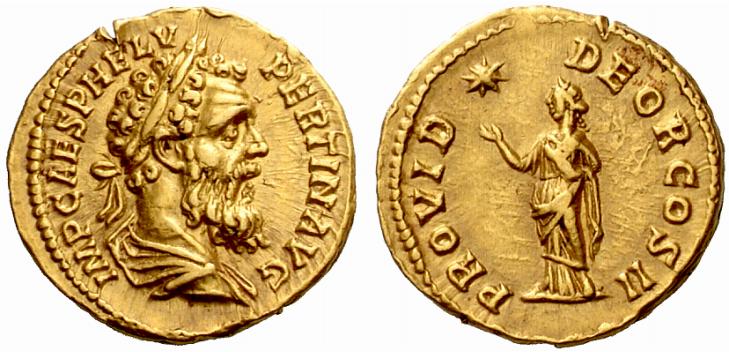|
Quintus Pompeius Sosius Falco
Quintus Pompeius Sosius Falco (flourished 190s) was a Roman senator, who was active during the reign of Commodus. He was '' consul ordinarius'' in 193 with Gaius Julius Erucius Clarus Vibianus as his colleague. Falco was the son of Quintus Pompeius Senecio Sosius Priscus, a patrician and consul in 149; Edward Champlin hypothesizes that his mother was Ceionia Fabia, further hypothesizing she was married to Priscus before marrying Plautius Quintillus. Falco's paternal ancestors include Sextus Julius Frontinus (consul in 73, again in 98, and a third time in 100) and Quintus Sosius Senecio, consul in 99 and again in 107. Life The emperor Commodus had planned to murder both consuls and usurp their offices, intending a procession as sole consul and ''primus palus secutorum'' from the barracks of the gladiators. Knowledge of that plan, according to Dio Cassius, led to Commodus's assassination. The ''Historia Augusta'' reports that at the first meeting of the Senate for that year ... [...More Info...] [...Related Items...] OR: [Wikipedia] [Google] [Baidu] |
Roman Empire
The Roman Empire ( la, Imperium Romanum ; grc-gre, Βασιλεία τῶν Ῥωμαίων, Basileía tôn Rhōmaíōn) was the post- Republican period of ancient Rome. As a polity, it included large territorial holdings around the Mediterranean Sea in Europe, North Africa, and Western Asia, and was ruled by emperors. From the accession of Caesar Augustus as the first Roman emperor to the military anarchy of the 3rd century, it was a Principate with Italia as the metropole of its provinces and the city of Rome as its sole capital. The Empire was later ruled by multiple emperors who shared control over the Western Roman Empire and the Eastern Roman Empire. The city of Rome remained the nominal capital of both parts until AD 476 when the imperial insignia were sent to Constantinople following the capture of the Western capital of Ravenna by the Germanic barbarians. The adoption of Christianity as the state church of the Roman Empire in AD 380 and the fall of th ... [...More Info...] [...Related Items...] OR: [Wikipedia] [Google] [Baidu] |
Lycia
Lycia ( Lycian: 𐊗𐊕𐊐𐊎𐊆𐊖 ''Trm̃mis''; el, Λυκία, ; tr, Likya) was a state or nationality that flourished in Anatolia from 15–14th centuries BC (as Lukka) to 546 BC. It bordered the Mediterranean Sea in what is today the provinces of Antalya and Muğla in Turkey as well some inland parts of Burdur Province. The state was known to history from the Late Bronze Age records of ancient Egypt and the Hittite Empire. Lycia was populated by speakers of the Luwian language group. Written records began to be inscribed in stone in the Lycian language (a later form of Luwian) after Lycia's involuntary incorporation into the Achaemenid Empire in the Iron Age. At that time (546 BC) the Luwian speakers were decimated, and Lycia received an influx of Persian speakers. Ancient sources seem to indicate that an older name of the region was Alope ( grc, Ἀλόπη}, ). The many cities in Lycia were wealthy as shown by their elaborate architecture starting at l ... [...More Info...] [...Related Items...] OR: [Wikipedia] [Google] [Baidu] |
Year Of Death Missing
A year or annus is the orbital period of a planetary body, for example, the Earth, moving in its orbit around the Sun. Due to the Earth's axial tilt, the course of a year sees the passing of the seasons, marked by change in weather, the hours of daylight, and, consequently, vegetation and soil fertility. In temperate and subpolar regions around the planet, four seasons are generally recognized: spring, summer, autumn and winter. In tropical and subtropical regions, several geographical sectors do not present defined seasons; but in the seasonal tropics, the annual wet and dry seasons are recognized and tracked. A calendar year is an approximation of the number of days of the Earth's orbital period, as counted in a given calendar. The Gregorian calendar, or modern calendar, presents its calendar year to be either a common year of 365 days or a leap year of 366 days, as do the Julian calendars. For the Gregorian calendar, the average length of the calendar yea ... [...More Info...] [...Related Items...] OR: [Wikipedia] [Google] [Baidu] |
Sosii
The gens Sosia, occasionally written Sossia, was a plebeian family at ancient Rome. Members of this gens occur in history from the end of the Republic down to the third century AD. The first of the Sosii to attain the consulship was Gaius Sosius in 32 BC, and the family would continue holding various positions in the Roman state until the third century. Praenomina The praenomina associated with the Sosii of the Republic were '' Quintus'', ''Titus'' and ''Gaius''. The Sosii Falcones of imperial times used ''Quintus'' and ''Marcus''. All of these were extremely common throughout Roman history. Branches and cognomina The original Italian members of the gens were probably of Picentine origin. A distinct family of Sosii appears prominently in the Senate during the reign of Emperor Domitian onward, and its progenitors seem to have been easterners. It is likely that an ancestor of theirs received Roman citizenship from Gaius Sosius, when the latter had served as governor of Syri ... [...More Info...] [...Related Items...] OR: [Wikipedia] [Google] [Baidu] |
Imperial Roman Consuls
Imperial is that which relates to an empire, emperor, or imperialism. Imperial or The Imperial may also refer to: Places United States * Imperial, California * Imperial, Missouri * Imperial, Nebraska * Imperial, Pennsylvania * Imperial, Texas * Imperial, West Virginia * Imperial, Virginia * Imperial County, California * Imperial Valley, California * Imperial Beach, California Elsewhere * Imperial (Madrid), an administrative neighborhood in Spain * Imperial, Saskatchewan, a town in Canada Buildings * Imperial Apartments, a building in Brooklyn, New York * Imperial City, Huế, a palace in Huế, Vietnam * Imperial Palace (other) * Imperial Towers, a group of lighthouses on Lake Huron, Canada * The Imperial (Mumbai), a skyscraper apartment complex in India Animals and plants * '' Cheritra'' or imperial, a genus of butterfly Architecture, design, and fashion * Imperial, a luggage case for the top of a coach * Imperial, the top, roof or second-storey compartm ... [...More Info...] [...Related Items...] OR: [Wikipedia] [Google] [Baidu] |
Senators Of The Roman Empire
A Senator is a member of a senate, such as the United States Senate. Senator or Senators may also refer to: People *Senator (bishop of Milan) (died 475), also known as Senator of Settala * Senator (consul 436), a politician of the Eastern Roman Empire * Henry of Castile the Senator (1230–1303), Castilian infante; the fourth son of Ferdinand III of Castile by Beatrice of Swabia *"The Senator", nickname for American jazz bassist Eugene Wright, member of The Dave Brubeck Quartet * Hermann Senator (1834–1911), German internist physician *Ronald Senator (1926–2015), British composer Sport teams *Ottawa Senators, a Canadian hockey team *Washington Senators (1961-1971), a U.S. baseball team in the American League, now the Texas Rangers * Washington Senators (1901–1905 and 1956–1960), a U.S. baseball team in the American League, based in Washington from 1901 to 1960 though officially named the Nationals during 1905–1955, now the Minnesota Twins * Washington Senators (1891-18 ... [...More Info...] [...Related Items...] OR: [Wikipedia] [Google] [Baidu] |
Publius Julius Scapula Priscus
Publius may refer to: Roman name * Publius (praenomen) * Ancient Romans with the name: ** Publius Valerius Publicola (died 503 BC), Roman consul, co-founder of the Republic **Publius Clodius Pulcher (c. 93 BC – 52 BC), Republican politician **Publius Cornelius Scipio (died 211 BC), Roman consul **Publius Quinctilius Varus (46 BC – 9 AD), Roman general and politician, who commanded the legions in Battle of the Teutoburg Forest **Publius Clodius Thrasea Paetus (died 66 AD), senator during Nero's reign **Publius Aelius Fortunatus, Roman painter in the 2nd century AD **Publius Servilius Casca Longus, better known as Servilius Casca (died 42 BC), Roman tribune and one of the assassins of Julius Caesar **Publius Aelius Hadrianus, the Emperor Hadrian (76–138 AD) **Publius Cornelius Lentulus Spinther, Roman patrician contemporary with Julius Caesar ** Publius Cornelius Tacitus (56 AD – after 117), better known as Tacitus, a senator and a historian of the Roman Empire ** Publius H ... [...More Info...] [...Related Items...] OR: [Wikipedia] [Google] [Baidu] |
Quintus Tineius Sacerdos
Quintus Tineius Sacerdos (c. 160 – aft. 219) was a Roman senator. He is attested as Consul Suffectus 16 March 193 with Publius Julius Scapula Priscus. As a youth he was a member of the college of the Salii Palatini. Offices he held as an adult included Governor of Bithynia et Pontus, and Proconsul of Asia sometime between 200 and 210. The apex of his career was serving as Consul Ordinarius in 219 with Emperor Elagabalus. Sacerdos was the son of Quintus Tineius Sacerdos Clemens. His brothers were Quintus Tineius Rufus and Quintus Tineius Clemens.O. Salomies"Die Herkunft der senatorischen Tineii" ''Zeitschrift für Papyrologie und Epigraphik The ''Zeitschrift für Papyrologie und Epigraphik'' (commonly abbreviated ZPE; "Journal of Papyrology and Epigraphy") is a peer-reviewed academic journal which contains articles that pertain to papyrology and epigraphy. It has been described as "th ...'', 60 (1985), p. 199 Family tree References {{DEFAULTSORT:T ... [...More Info...] [...Related Items...] OR: [Wikipedia] [Google] [Baidu] |
List Of Late Imperial Roman Consuls
A ''list'' is any set of items in a row. List or lists may also refer to: People * List (surname) Organizations * List College, an undergraduate division of the Jewish Theological Seminary of America * SC Germania List, German rugby union club Other uses * Angle of list, the leaning to either port or starboard of a ship * List (information), an ordered collection of pieces of information ** List (abstract data type), a method to organize data in computer science * List on Sylt, previously called List, the northernmost village in Germany, on the island of Sylt * ''List'', an alternative term for ''roll'' in flight dynamics * To ''list'' a building, etc., in the UK it means to designate it a listed building that may not be altered without permission * Lists (jousting), the barriers used to designate the tournament area where medieval knights jousted * ''The Book of Lists'', an American series of books with unusual lists See also * The List (other) * Listing ( ... [...More Info...] [...Related Items...] OR: [Wikipedia] [Google] [Baidu] |
Pertinax
Publius Helvius Pertinax (; 1 August 126 – 28 March 193) was Roman emperor for the first three months of 193. He succeeded Commodus to become the first emperor during the tumultuous Year of the Five Emperors. Born the son of a freed slave, Pertinax became an officer in the army. He fought in the Roman–Parthian War of 161–166, where his success led him to be promoted to higher positions in both the military and political spheres. He achieved the rank of provincial governor and urban prefect. He was a member of the Roman Senate, serving at the same time as the historian Cassius Dio. Following the death of Commodus, Pertinax was proclaimed emperor. He attempted to institute several reform measures, although the short duration of his reign as emperor prevented the success of those attempts. One of those reforms, the restoration of discipline among the Praetorian Guard, led to conflict that eventually culminated in Pertinax's assassination by the Guard. Pertinax would ... [...More Info...] [...Related Items...] OR: [Wikipedia] [Google] [Baidu] |

.jpg)



